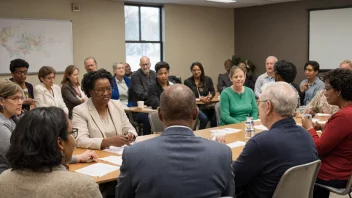Introduction
Food insecurity is a pressing issue affecting millions around the world, and spiritual communities are stepping up to make a difference. This article will guide you through how these communities address food insecurity, highlighting initiatives and actions you can take to contribute. By the end, you'll understand the multifaceted approach spiritual communities take in alleviating hunger and how you can get involved.
Step 1: Understand the Issue
Before diving into how spiritual communities tackle food insecurity, it's important to grasp the scale and implications of the problem.
- Statistics: Learn about food insecurity rates in your area and globally.
- Causes: Identify the socio-economic factors contributing to food insecurity, such as poverty, unemployment, and lack of education.
Step 2: Explore Community Initiatives
Spiritual communities often engage in various initiatives to combat food insecurity.
- Food Pantries: Many religious organizations operate food pantries, providing free food to those in need.
- Soup Kitchens: These establishments serve hot meals to individuals and families experiencing hunger.
- Community Gardens: Some spiritual groups cultivate gardens to grow fresh produce for their communities.
- Education Programs: Workshops on nutrition and cooking help empower individuals to make healthier food choices.
Step 3: Get Involved
There are numerous ways for you to contribute to these initiatives.
- Volunteer: Offer your time at local food pantries or soup kitchens.
- Organize a Food Drive: Collaborate with your spiritual community to collect non-perishable food items.
- Support Community Gardens: Join a local garden project to help grow food for those in need.
- Advocate: Raise awareness about food insecurity issues within your community and encourage others to take action.
Step 4: Collaborate with Local Organizations
Partnering with established organizations can amplify your efforts.
- Identify Local Partners: Research local non-profits and organizations focused on food security.
- Form Alliances: Work together to create larger food distribution events or educational workshops.
- Share Resources: Pool resources such as volunteers, funds, and facilities to enhance your outreach.
Step 5: Reflect on the Spiritual Aspect
Addressing food insecurity is not just about providing food; it also involves spiritual nourishment.
- Community Support: Foster a sense of belonging and support among those facing food insecurity.
- Spiritual Guidance: Offer counseling and spiritual support to individuals struggling with the emotional burden of hunger.
- Promote Values: Encourage values such as generosity, compassion, and community responsibility.
Conclusion
Spiritual communities play a vital role in addressing food insecurity through initiatives that promote both physical and spiritual nourishment. By understanding the issue, exploring community efforts, getting involved, collaborating with organizations, and reflecting on the spiritual aspects, you can make a significant impact. Every action counts, and together, we can work towards a future where everyone has access to sufficient and nutritious food.






